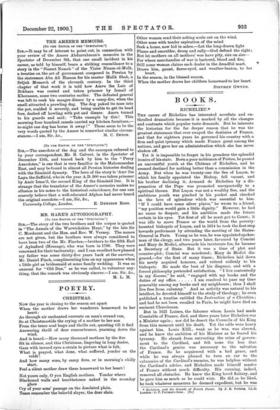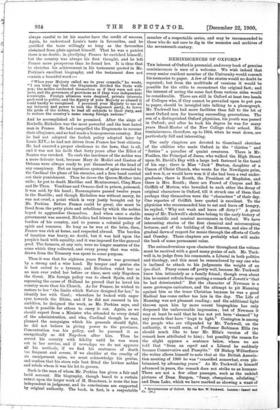BOOKS.
RICHELIEU.*
THE career of Richelieu has interested novelists and en- thralled dramatists because it is marked by all the changes and contrasts which popular taste demands. But he interests the historian for the far deeper reason that he was the greatest statesman that ever swayed the destinies of France, and that for eighteen years he governed his country with a firm and quiet tyranny which made France great among the nations, and gave her an administration which she has never shaken off.
Yet it is impossible to forget in his grandeur the splendid ironies of his state. Born a poor nobleman of Poitou, he passed an uneventful youth at the Chiteau of Richelieu, and he seemed destined for nothing better than a commission in the Army. But when he was twenty-one the See of Lucon, to which his family appointed the Bishop, fell vacant, and his brother declining it, Armand de Richelieu by a dis- pensation of the Pope was promoted unexpectedly to a spiritual throne. But Lueon was not a wealthy See, and the ambitious youth was pinched in his pocket and checked in the love of splendour which was essential to him. "If I could have some silver plates," he wrote to a friend, " my position would gain a little dignity." However, he had no cause to despair, and his ambition made the future certain in his eyes. Yet first of all he must get to Court ; it was idle to move France or the world from the poverty- haunted bishopric of Lueon, and in 1614 he took the first step towards preferment by attending the meeting of the States- General in Paris. Young as he was, he was appointed spokes- man of the clergy, and two years later, favoured by Concini and Mary de Medici, afterwards his inveterate foe, he became a Secretary of State. But it was a time of plot and counter-plot; Concini was murdered; Mary de Medici dis- graced,—for the first of many times ; Richelieu laid down his newly acquired honours, and retired sullenly to his bishopric. He made the best of his disgrace, and with a forced philosophy pretended satisfaction. " I live contentedly in my diocese," he said, " engaged with my books and the
duties of my office I am resolved to pass my time peaceably among my books and my neighbours ; thus I shall live free from calumny." And as activity was natural to his intellect, he devoted himself to the study of theology ; he even published a treatise entitled the Instruction of a Christian ; and had he not been recalled to Paris, he might have died an eminent Churchman.
But in 1621 Luines, the falconer whom Louis had made Constable of France, died, and three years later Richelieu was a Minister again ; nor did he desert the Councils of his King from this moment until his death. Yet the odds were heavy against him. Louis %III., weak as he was, was shrewd, and he knew the ambition of his Minister as he feared his tyranny. He shrank from entrusting the reins of govern- ment to the Cardinal, and felt none the less that the Cardinal's genius was necessary to the salvation of France. So he acquiesced with a bad grace, and while he was always pleased to turn an ear to the calumnies of the Cardinal's enemies, he was helpless without the Cardinal's advice, and Richelieu made himself master of France without much difficulty. His cunning, indeed, removed all obstacles. He knew the King loved flattery, and he gave him as much as he could wish. He did as he liked, he took whatever measures he deemed expedient, but he was • Richelieu, and the Growth of French Power. By J. B. Perkins, LL.D. London : G. P. Putnam's Sons . [NJ
always careful to let his master have the credit of success. Again, he understood Louis's taste in favourites, and he gratified the taste willingly so long as the favourites abstained from plots against himself. That he was a patriot there is no doubt; in glorifying France he enriched himself ; but the country was always his first thought, and he left France more prosperous than he found her. It is thus that he sketches his achievement in his testament quoted in Mr. Perkins's excellent biography, and the testament does not contain a boastful word :—
" When your Majesty called me to your councils," he wrote, "I can truly say that the Huguenots divided the State with you; the nobles conducted themselves as if they were not sub- jects, and the governors of provinces as if they were independent sovereigns. Foreign alliances were despised, private interests preferred to public, and the dignity of your Majesty so abused it could hardly be recognised. I promised your Majesty to use all my industry and power to ruin the Huguenot party, to lower the pride of the nobles, to lead all subjects to their duty, and to restore the country's name among foreign nations."
And he accomplished all he promised. After the siege of Rochelle, Richelieu was the most powerful and the best hated man in France. He had compelled the Huguenots to resume
their allegiance, and so had made a homogeneous country. But he had not adopted the foolish policy adopted later by Louis XIV.: he had not driven from France her best citizens.
He had exacted a proper obedience to the laws, that is all, and it was not his fault that forty years after the Edict of Nantes was revoked. To curb the insolence of the nobles was
a more delicate task, because Mary de Medici and Gaston of Orleans were always ready to put themselves at the head of
any conspiracy. But an ingenious system of spies revealed to the Cardinal the plans of his enemies, and a firm hand carried out their punishment. Thus he drove the Queen-Mother into exile; he put to death Marillac and Montmorenoi, Cinq-Mars and De Thou. Vend6me and Ornano died in prison, poisoned, it was said, by his hand ; Bassompierre passed twelve years in the Bastille ; and though Richelieu was without meroy, he was not cruel, a point which is very justly brought out by Mr. Perkins. Before France could be great, she must be freed from the petty plots and rebellions by which the nobles hoped to aggrandise themselves. And when once a stable government was assured, Richelieu had leisure to increase the borders of his country, and to pursue a colonial policy of spirit and resource. So long as he was at the helm, then, France was rich at home, and respected abroad. The burden of taxation was heavy, no doubt, but it was laid upon the people's back with equality, and it was imposed for the general good. The farmers, at any rate, were no longer masters of the sums which they collected, and every penny that was with- drawn from the Treasury was spent to some purpose.
Thus it was that for eighteen years France was governed by a strong and a wise hand. By temper and genius she is best suited to a tyranny, and Richelieu ruled her as no man ever ruled her before or since, save only Napoleon the Great. His foreign policy was to check Spain, and in espousing the cause of Holland he proved that he loved his country more than his Church. As for France, he wished to
restore to her " the limits which Nature designed for her," to identify her with Gaul ; wherefore he looked with eager eyes towards the Rhine, and if he did not succeed in his ambition, he designed the work, as Mr. Perkins says, and made it possible for others to carry it out. Again, as we should expect from a Minister who attended to every detail of the administration, and who, Cardinal though he was, planned the campaigns which his generals should fight, he did not believe in giving power to the provinces. Concentration was his policy, and he pursued it as energetically as did Napoleon after him. Thus he served his country with fidelity until he was worn out in her service, and if nowadays we do not approve all his methods, if we find his sentences of death too frequent and severe, if we shudder at the cruelty of his omnipresent spies, we must acknowledge his genius, and confess that his stern rule best fitted the lawless nobles and rebels whom it was his lot to govern.
Such is the man of whom Mr. Perkins has given a fair and lucid account. His biography, though based to a certain extent upon the larger work of M. Hanotaux, is none the less independent in judgment, and its conclusions are supported
by original authority. The book, in fact, is a respectable member of a respectable series, and may be recommended to those who do not care to dig in the memoirs and archives of the seventeenth century.







































 Previous page
Previous page